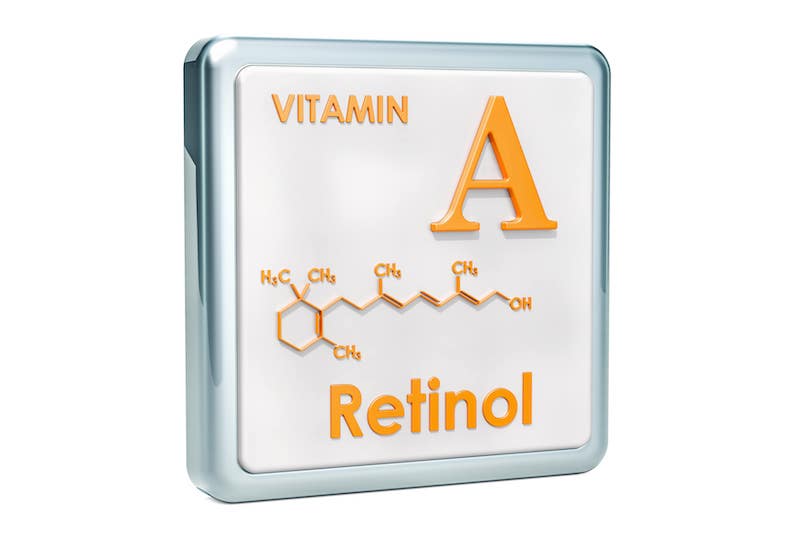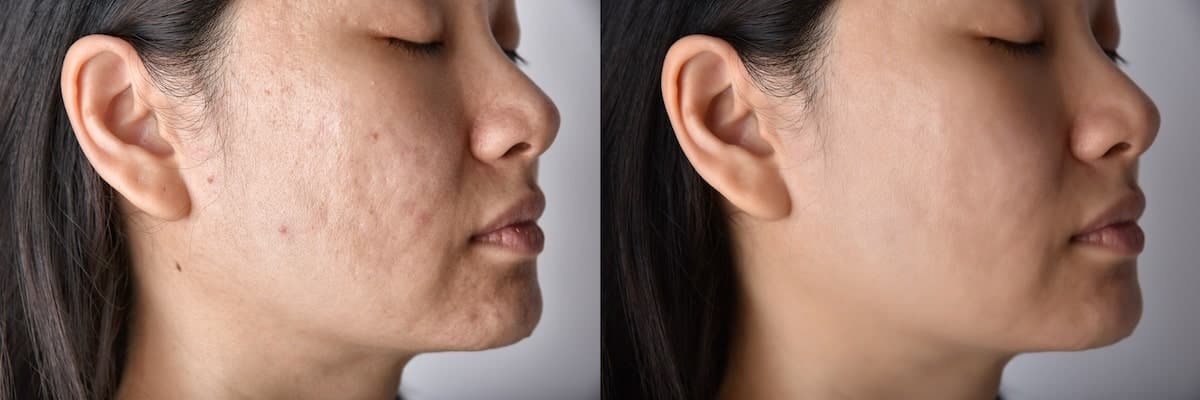Retinol is a popular and effective skincare ingredient often found in “anti-aging” products. But what exactly is retinol? In this comprehensive guide, we’ll explore what retinol is, how it works, and what benefits and drawbacks it can have for your skin.
What is retinol?
Retinol is a type of retinoid, which is a group of vitamin A derivatives used in skincare products. Retinol is the most well-known and widely used form of retinoid in skincare, and it has been used for decades to fight signs of ageing, improve texture and even out skin tone. It has increased considerably in popularity recently.

What is retinol made of?
Retinol is a type of retinoid that is a group of vitamin A derivatives. It is produced from carotenoids, which are found in vegetables and fruit, and is then converted to retinol in the body. Retinol is also used in a range of skincare products and can also be produced synthetically in laboratories. Synthetically produced retinol is often used in skincare products due to its stability and effectiveness.
What is the difference between synthetic and natural retinol?
The fundamental difference between naturally produced and synthetically produced retinol is how they are produced. Natural retinol comes from plants and animals, while synthetic retinol is produced in laboratories using chemical processes.
Skincare products
When it comes to skincare products, both forms of retinol will have a similar effect on the skin when used in the right concentration and form. However, synthetic retinol is usually more stable and less prone to oxidation and degradation than natural retinol. This means that synthetic retinol may have a longer shelf life and may be more effective in skincare products.
It’s also worth noting that natural retinol is not always the same as pure vitamin A, and can sometimes have varying potency or effectiveness. Therefore, synthetic retinol can be a more reliable and consistent source of vitamin A for skincare products.
Natural vs synthetic
Ultimately, it will be up to personal preferences and values to decide whether you prefer natural or synthetic retinol in your skincare products. Whichever form is chosen, it is important to select a concentration and form of retinol that is suitable for your skin type and condition.
How does retinol work?
Increases cell renewal
Retinol works by increasing cell renewal in the skin . Cell renewal is a natural process where old skin cells are replaced with new, fresh cells. This helps to keep the skin healthy and glowing. However, this process can slow down with age, leading to slower cell renewal and less glowing skin. Retinol stimulates cell renewal in the skin, so that old skin cells are replaced more quickly with new, healthy cells. This can help reduce the visibility of fine lines, wrinkles and sun damage.
Stimulates increased collagen production
Retinol also stimulates collagen production in the skin. Collagen is an important protein found in the skin that helps to give it a firm and youthful texture. However, collagen production can also decline with age, which can lead to a loss of firmness and elasticity in the skin. By stimulating collagen production, retinol can help give the skin a firmer and more youthful appearance.
Evens out skin tone and reduces acne scars
Retinol can also help even out skin tone and reduce the visibility of acne scars and large pores. Retinol contains anti-inflammatory properties, which can help reduce inflammation in the skin. This in turn can help reduce the visibility of acne scars and large pores. In addition, retinol can also help even out skin tone by reducing the visibility of pigmentation, which can lead to uneven skin tone and sun damage.

Pros and cons of retinol
Benefits:
- Reduces the visibility of fine lines and wrinkles
- Evens out skin tone and reduces the visibility of sun damage, acne scars and large pores
- Stimulates collagen production for firmer and more youthful skin
- Can help reduce acne breakouts
Disadvantages:
- Retinol can cause irritation, redness and dryness of the skin, especially at the beginning of use
- Retinol can make the skin more sensitive to sunlight, so it’s important to use sun protection when using retinol
- Retinol may be too strong for people with sensitive skin and can cause side effects such as itching, burning and rashes

Is retinol dangerous?
Some people may experience side effects when using retinol on the skin, especially when they first start using it.

Side effects

Side effects from retinol can include irritation, redness, dryness and flaking of the skin. This is because retinol increases cell renewal in the skin, which can lead to increased exfoliation and dryness. Retinol can also make the skin more sensitive to sunlight, so it’s important to use sun protection when using retinol.
Sensitive skin
While the side effects from retinol are usually mild and temporary, some people can experience more serious side effects, especially if they have very sensitive skin. For people with very sensitive skin, you may want to use retinol carefully and gradually build up its use over time.
In general, retinol is a safe and effective ingredient in skincare products when used correctly and in the right concentration for your skin type and condition. If you experience side effects from retinol, you may want to reduce its use or stop completely for a period of time. If symptoms persist or worsen, you should contact a dermatologist.
Can retinol damage your skin?
If you use retinol, you will be more prone to sunburn, which can damage your skin. The use of high doses of retinol may also be associated with the development of skin cancer. Be sure to wear sunscreen and avoid direct sunlight (with clothing and hat) while using retinol. There is not much good research on long-term effects.

How to manage side effects of retinol
How can you manage the side effects of retinol? Making small changes to your skincare routine can help reduce the redness and irritation that can occur when using retinol. You may want to:
- Use only one retinol product at a time.
- Use retinol every other day instead of every day.
- Wait 30 minutes after washing your face before applying the retinol product.
- Avoid retinol products if you have sunburn, broken skin or other skin irritations.
- Use sunscreen with SPF 30 and wear sun-protective clothing and hats to reduce exposure to the sun.
How to choose retinol products
When choosing a retinol product, it is important to look for a concentration that is suitable for your skin type and skin condition. In general, it is recommended to start with a lower concentration and gradually increase over time. It is also important to use retinol products at night and to avoid combining them with other irritating products such as acids or scrubs.
How to use retinol

Retinol can be an effective ingredient for improving the appearance of the skin, but it’s important to use it correctly to avoid side effects and maximize results. Here are some tips on how to use retinol in your skincare routine:
- Start slowly: If you’ve never used retinol before, you may want to start with a low concentration and use it just a few times a week to see how your skin reacts. Then you can gradually increase the concentration and frequency of use.
- Apply to clean skin: Retinol should be applied to clean and dry skin, preferably in the evening, after cleansing and toning your skin. This helps to maximize the effect of retinol and reduce the risk of irritation or side effects.
- Avoid the eyes and mouth: Retinol can be too strong for the skin around the eyes and mouth, so it’s important to avoid these areas when applying retinol.
- Use a moisturizer: Retinol can be harsh on the skin, so it’s important to use a moisturizer after applying retinol. This helps to moisturize the skin and reduce the risk of dryness and irritation.
- Use sun protection: Retinol can make your skin more sensitive to sunlight, so it’s important to wear sunscreen during the day to protect your skin from sun damage.
- Be patient: Retinol is not a quick fix and it may take a few weeks or months before you see results. It is important to be patient and consistent with the use of retinol to achieve the desired results.
- Consult with healthcare professionals: If you have a specific skin type, skin condition or have questions about using retinol, you may want to talk to a healthcare professional before you start using it. They can advise you on how to use retinol in a way that is safe and effective for your skin.

Common questions about retinol
It is not recommended to use retinol if you are pregnant or breastfeeding, as there is insufficient research on how it affects the fetus or infant.
Retinol may be too strong for people with sensitive skin and can cause side effects such as itching, burning and rashes. If you have sensitive skin, you may want to start with a lower concentration of retinol and gradually increase over time.
It is recommended to start by using retinol two to three times a week and gradually increase to daily use over time.
Results from retinol can vary depending on skin type and skin condition. In general, it can take from a few weeks to several months before you see significant results from retinol.
If you experience side effects from retinol, such as irritation, redness or dryness, you may want to reduce or stop using it for a period of time. If symptoms persist or worsen, you should contact a dermatologist.
Different types?
Retinol vs. vitamin A
Vitamin A is a fat-soluble vitamin found in many foods and supplements that plays several important roles in your body. It helps with your organs and is involved in your immune system, vision and reproduction. Retinol is a form of Vitamin A that can be applied to the skin to improve skin tone and texture. So, you can think of it as a super ingredient that can help your skin look even better!
Retinoid vs. Retinol
Retinol and retinoid are vitamin A derivatives used to improve the texture and appearance of the skin. The main difference lies in their strength. Retinol is readily available without a prescription in serums, creams and is even used as an ingredient in some cosmetic products. Retinoids are made at higher concentrations and are available by prescription only, with one exception. So, while both of these ingredients can help your skin look great, keep in mind that retinoids are much stronger and must be used with caution and under the guidance of a healthcare professional.
Prescription vs. store
Prescription retinoids contain a higher concentration of active ingredients. So, if you see a healthcare professional and get a prescription retinoid, you may see more significant changes in your skin, faster. Purchased without a prescription retinol is usually combined with other ingredients. It can be more difficult to say how much of the active ingredient is in the product.
But the other ingredients in non-prescription retinol products can also moisturize and brighten your skin. So, whether you go for prescription or non-prescription retinoids, you will see a positive effect on your skin, but always remember to consult with your healthcare professional if you’re unsure what’s best for your skin type.
Tretinoin is a retinoid that is only available with a prescription. It has been used for decades to treat acne and signs of premature aging caused by sun damage. It’s stronger than retinol as you can buy it without a prescription, so it can actually work faster. So if you’ve tried over-the-counter retinol and haven’t seen as much change as you’d like, you may want to consider talking to your healthcare professional and see if tretinoin may be a better solution for your skin. But remember that tretinoin can also be a little harsher on the skin and can cause more serious side effects, so it’s always wise to talk to your healthcare professional before trying it.
Are there better alternatives?
While retinol is a very effective ingredient for improving the appearance of the skin, there can be some drawbacks or side effects that make some people look for alternative ingredients. Fortunately, there are several alternative ingredients that can provide similar benefits for your skin.
Some examples of alternative ingredients include:
- Vitamin A acid: A more potent form of vitamin A than retinol that can help reduce fine lines and wrinkles, but can also be more irritating to the skin. This is also an ingredient that usually requires a prescription.
- Bakuchiol : A plant-based ingredient known to have similar properties to retinol, but may be more gentle on the skin.
- Vitamin C: An antioxidant that can help protect the skin from free radical damage and brighten skin tone.
- Niacinamide : Also known as vitamin B3, can help reduce redness and irritation of the skin, as well as improve skin elasticity and even out skin tone.
- Peptides : These can help increase the production of collagen in the skin, which can help reduce fine lines and wrinkles.
- Collagen supplements: As retinol increases collagen formation, taking collagen supplements may be a more natural way to get the same type of effect.
It’s important to remember that ingredients work differently for different people, so you may want to experiment a little to find out what works best for your skin type and condition. You may also want to consult with a dermatologist or other healthcare professional to find out which ingredients are best for you.
Same effect with Autofagic?
Autophagy, which means “self-eating” in Greek, is a natural process in the body that helps remove old or damaged cells and replace them with new ones. It can be an interesting alternative to retinol as an anti-aging treatment. When the autophagy process is activated, cells begin to “eat” and break down unnecessary or damaged parts of themselves, and then use the released building blocks to create new and healthy cells.
This can help improve the appearance of the skin by improving skin elasticity, reducing fine lines and wrinkles, as well as providing a healthy and clear skin tone. While retinol is an effective ingredient for improving skin’s appearance, autophagy may be a more natural and body-friendly option to improve skin health and appearance. It is important to note that autophagy is a natural process in the body and there is limited research on how to boost this process specifically to improve the appearance of the skin. Evidence suggests that intermittent fasting can increase the autophagy process.
Conclusion
Retinol is a popular and effective ingredient in skincare that can help reduce the visibility of imperfections, wrinkles and sun damage. Even out skin tone and stimulate collagen production. However, it can also cause side effects such as irritation, redness and dryness, especially at the beginning of use. It is important to choose a retinol concentration that is suitable for your skin type and skin condition, and to use sun protection when using retinol. If you experience side effects, you should reduce or stop use and contact a dermatologist if symptoms persist.
We hope this guide has been helpful in understanding what retinol is and how it works, and helps you choose the right retinol product for your skin. If you have questions or need more information, contact a dermatologist or skincare expert.






